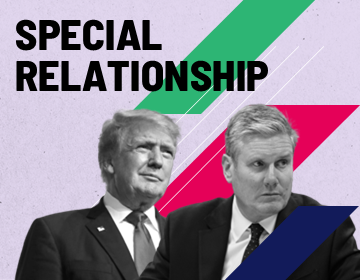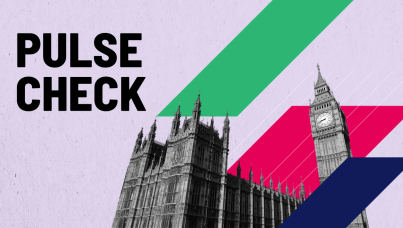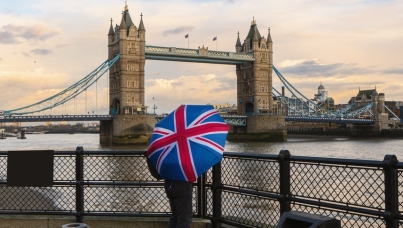Pulse Check - April 2025 Tariffs
Checking the pulse of the nation
-

Opposition to tariffs
A majority of Britons (74%) agree that increased tariffs will make regular household purchases more expensive, and 64% say that increasing tariffs will do more harm than good. These sentiments are broadly shared by Americans, albeit to a slightly lesser extent.
Click here -

Erosion of the "special relationship"
The first few months of the Trump administration have been marked by declining faith in the "special relationship" amongst the British public. Only three in ten (30%) Britons now agree there is currently a "special relationship" between the US and UK, a significant 17-point drop from the previous year (47% in May 2024).
Click here -

Pollster explains
Keiran Pedley, Director of UK Politics, breaks down Ipsos' latest polling insights in 60 seconds. Keiran dives into new data on the British public's response to Trump's tariffs. Quick, expert analysis of the data and what it means for the political landscape – all in just one minute.
Click here

Tariffs, u-turns & trade headaches: what you need to know
It’s been quite the week. President Trump jolted markets and rattled boardrooms across the globe by announcing sweeping new tariffs. Markets recoiled, strategies were shelved, and foreign leaders started to consider the possibility of a full-blown trade war. Then, just as quickly, Trump pivoted: a 90-day delay on the tariffs - for every country except China.
But we're not in the clear yet. Nearly every US trading partner, including the UK, is facing a 10% blanket tariff on imported goods and a 25% tariff on steel, aluminum, and automobiles - so the economic tremors are far from over.
Unsurprisingly, the tariffs aren't popular...
The British public aren't happy. A clear majority (63%) of Britons believe Donald Trump has done a bad job handling the tariff situation (18% good job), and 41% believe the US mostly uses its influence for bad in the world, a stark 25-point increase from April 2024.
Britons are also worried - 66% expect the tariffs to hurt the UK economy, 68% expect a negative impact to global economies and 41% are bracing for a personal financial impact. In other words: people aren’t just worried about the big picture, they’re expecting these policies to hit their own wallets.
Starmer: cool, calm and collected?
In the face of Trump's trade policy, the Prime Minister is sticking with his 'cool and calm' approach rather than imposing retaliatory tariffs like the EU and China, in the hopes of negotiating a better deal for Britain.
This approach seems to be resonating with the public, for now - 51% support agreeing a trade deal with the US to reduce trade barriers, indicating a degree of understanding for Keir Starmer’s current cooperative approach. That said, 44% support both introducing retaliatory tariffs on US goods as well as the 42% who support holding off on imposing them immediately but keeping them as a future option, so there may come a point where the British public want to see a more robust response.
A crucial indicator here will be perceptions of the negative economic impact of tariffs on people’s personal finances, and what impact this will have on what action Britons want the UK government to take.
What's next?
Tariff turbulence is far from settled, and political responses (both at home and abroad) are still evolving. Watching the policies and the polling will be essential over the next few weeks as public sentiment may be the clearest indicator of where the next move comes from.







